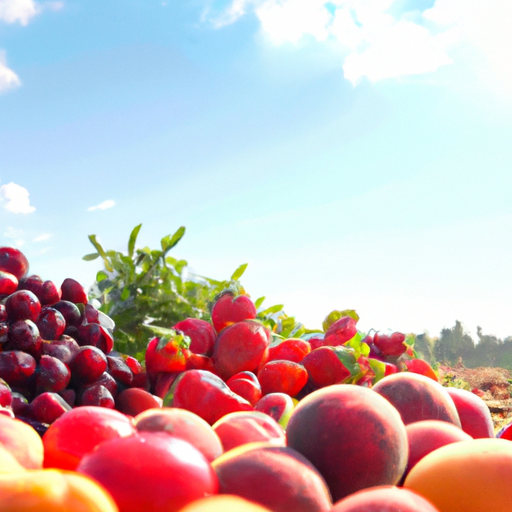
The Role of UNWTO in Promoting Sustainable Agriculture, Gastronomy, and Tourism Integration
The United Nations World Tourism Organization (UNWTO) plays a crucial role in promoting the integration of agriculture, gastronomy, and tourism. By recognizing the interdependence of these sectors, the UNWTO aims to strengthen the connection between them and create sustainable development opportunities.
One of the key ways in which the UNWTO promotes this integration is through its support for sustainable agriculture practices. Agriculture is not only a vital source of food and income for many communities around the world, but it also plays a significant role in preserving biodiversity and protecting the environment. The UNWTO recognizes the importance of sustainable agriculture in ensuring the long-term viability of the tourism industry and works to promote practices that minimize the negative impacts of agriculture on the environment.
In addition to supporting sustainable agriculture, the UNWTO also recognizes the importance of gastronomy in enhancing the tourism experience. Food is an integral part of any culture, and by promoting local cuisine, the UNWTO helps to preserve cultural heritage and promote sustainable tourism. By encouraging tourists to try local dishes and supporting initiatives that promote traditional cooking methods and ingredients, the UNWTO helps to create a more authentic and enriching travel experience.
Furthermore, the UNWTO recognizes that the integration of agriculture, gastronomy, and tourism can have significant economic benefits for local communities. By promoting the consumption of local products and supporting initiatives that connect farmers and producers with the tourism industry, the UNWTO helps to create new income opportunities and stimulate economic growth. This not only benefits local communities but also helps to diversify the tourism industry and reduce its reliance on mass tourism.
To achieve its goals, the UNWTO works closely with governments, tourism organizations, and other stakeholders to develop policies and initiatives that promote the integration of agriculture, gastronomy, and tourism. It provides technical assistance and capacity-building support to help countries develop sustainable agriculture and gastronomy strategies and works to raise awareness about the importance of these sectors in the tourism industry.
The UNWTO also organizes events and campaigns to promote the integration of agriculture, gastronomy, and tourism. For example, it hosts the World Forum on Gastronomy Tourism, which brings together experts from around the world to discuss best practices and innovative approaches in this field. It also supports initiatives such as the Sustainable Gastronomy Day, which aims to raise awareness about the importance of sustainable gastronomy and its role in promoting sustainable development.
In conclusion, the UNWTO plays a crucial role in promoting the integration of agriculture, gastronomy, and tourism. By recognizing the interdependence of these sectors and working to strengthen the connection between them, the UNWTO helps to create sustainable development opportunities and enhance the tourism experience. Through its support for sustainable agriculture practices, promotion of local cuisine, and efforts to stimulate economic growth, the UNWTO is making a significant contribution to the sustainable development of the tourism industry.
Exploring the Benefits of Linking Agriculture, Gastronomy, and Tourism for Local Communities

Strengthening the Connection: UNWTO’s Efforts in Integrating Agriculture, Gastronomy, and Tourism
Exploring the Benefits of Linking Agriculture, Gastronomy, and Tourism for Local Communities
When it comes to travel, many people seek authentic experiences that allow them to immerse themselves in the local culture. One way to achieve this is by exploring the connection between agriculture, gastronomy, and tourism. The United Nations World Tourism Organization (UNWTO) recognizes the potential of this integration and has been actively working to strengthen the bond between these three sectors.
Linking agriculture, gastronomy, and tourism can bring numerous benefits to local communities. Firstly, it promotes sustainable development by supporting local farmers and producers. By incorporating locally sourced ingredients into their menus, restaurants and hotels can contribute to the growth of the agricultural sector. This, in turn, helps to preserve traditional farming practices and protect biodiversity.
Furthermore, this integration creates economic opportunities for local communities. When tourists are exposed to the unique flavors and culinary traditions of a destination, they are more likely to spend money on local products and services. This can lead to increased revenue for farmers, food producers, and artisans, ultimately boosting the local economy.
In addition to economic benefits, linking agriculture, gastronomy, and tourism also has social advantages. It helps to preserve cultural heritage and traditions by showcasing local cuisine. Traditional recipes and cooking techniques are passed down through generations, and by promoting them to tourists, communities can ensure their preservation for years to come.
Moreover, this integration encourages community engagement and empowerment. Local farmers and producers become active participants in the tourism industry, gaining recognition for their contributions. This not only enhances their sense of pride but also encourages them to continue producing high-quality products that are valued by both locals and visitors.
The UNWTO has been at the forefront of efforts to strengthen the connection between agriculture, gastronomy, and tourism. Through its initiatives, the organization aims to raise awareness about the importance of this integration and provide support to destinations looking to implement it.
One of the UNWTO’s flagship projects in this area is the “UNWTO Gastronomy Network.” This network brings together tourism and gastronomy stakeholders from around the world to share best practices and collaborate on projects that promote sustainable gastronomy tourism. By facilitating knowledge exchange and fostering partnerships, the network helps destinations leverage their culinary heritage to attract tourists and boost local development.
Another notable initiative is the “UNWTO Affiliate Members Programme on Gastronomy Tourism.” This program provides training and capacity-building opportunities for tourism professionals, helping them develop the skills needed to promote gastronomy tourism effectively. By equipping professionals with the necessary knowledge and tools, the UNWTO aims to ensure the sustainable development of the sector.
In conclusion, the integration of agriculture, gastronomy, and tourism holds great potential for local communities. By linking these sectors, destinations can promote sustainable development, create economic opportunities, preserve cultural heritage, and empower local communities. The UNWTO’s efforts in this area are crucial in raising awareness and providing support to destinations looking to strengthen this connection. Through initiatives like the “UNWTO Gastronomy Network” and the “UNWTO Affiliate Members Programme on Gastronomy Tourism,” the organization is playing a vital role in promoting the benefits of this integration and helping destinations harness its full potential.
Case Studies: Successful Examples of UNWTO’s Initiatives in Integrating Agriculture, Gastronomy, and Tourism
Case Studies: Successful Examples of UNWTO’s Initiatives in Integrating Agriculture, Gastronomy, and Tourism
When it comes to promoting sustainable tourism, the United Nations World Tourism Organization (UNWTO) has been at the forefront of efforts to integrate agriculture, gastronomy, and tourism. By recognizing the interconnections between these three sectors, the UNWTO has been able to create innovative initiatives that not only benefit local communities but also enhance the overall travel experience for tourists.
One successful example of the UNWTO’s initiatives is the “Tourism and Gastronomy: The Taste of the Camino” project in Spain. This project aims to promote the gastronomic heritage of the Camino de Santiago, a popular pilgrimage route, by encouraging tourists to explore local cuisine and traditional food products. By doing so, the project not only supports local farmers and producers but also helps to preserve traditional culinary practices that are deeply rooted in the region’s cultural heritage.
Another noteworthy initiative is the “Tourism and Wine: A Great Wine Capital Experience” project in Portugal. This project focuses on promoting wine tourism in the Douro Valley, a UNESCO World Heritage site known for its vineyards and wineries. By integrating wine production, wine tourism, and local gastronomy, the project aims to create a unique and immersive experience for tourists. Visitors can not only learn about the winemaking process but also indulge in wine tastings and pairings with local dishes, thus supporting local wine producers and boosting the local economy.
Moving to Asia, the “Tourism and Agriculture: The Rice Terraces of the Philippine Cordilleras” project showcases the rich agricultural heritage of the Ifugao people. The project aims to preserve the traditional rice terraces, which are not only a breathtaking sight but also an important part of the local culture and livelihoods. By promoting sustainable tourism practices, such as responsible hiking and cultural immersion activities, the project helps to protect the rice terraces while providing economic opportunities for the local communities.
In Africa, the “Tourism and Agriculture: The Coffee Route in Ethiopia” project highlights the country’s rich coffee culture. Ethiopia is known as the birthplace of coffee, and this project aims to promote sustainable coffee tourism by connecting tourists with local coffee farmers and cooperatives. Visitors can learn about the coffee production process, participate in coffee tasting sessions, and even take part in traditional coffee ceremonies. By doing so, the project not only supports local coffee farmers but also helps to raise awareness about the importance of sustainable coffee production.
These case studies demonstrate the UNWTO’s commitment to integrating agriculture, gastronomy, and tourism in a way that benefits both local communities and tourists. By promoting sustainable practices and preserving cultural heritage, these initiatives not only enhance the travel experience but also contribute to the overall development and well-being of the destinations.
In conclusion, the UNWTO’s efforts in integrating agriculture, gastronomy, and tourism have resulted in successful initiatives that promote sustainable tourism practices and support local communities. Through projects like “The Taste of the Camino” in Spain, “A Great Wine Capital Experience” in Portugal, “The Rice Terraces of the Philippine Cordilleras” in the Philippines, and “The Coffee Route in Ethiopia,” the UNWTO has shown that by recognizing the interconnections between these sectors, we can create a more enriching and sustainable travel experience for all.


